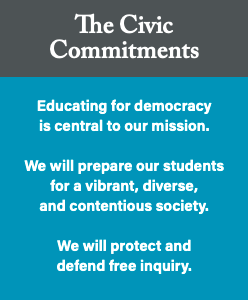At the intersection of education and democracy, college presidents are leading efforts to empower the next generation of engaged citizens.
More than 70 college presidents from public and private institutions nationwide have joined the College Presidents for Civic Preparedness consortium. Convened by the Institute for Citizens & Scholars, this initiative strengthens the role of higher education in upholding democratic principles amid today’s rapidly changing social and political landscape.
The consortium, which has grown from an initial 15 members since Insight Into Diversity first reported on its formation in August 2023, aims to reframe the often polarizing debate around free speech and diversity through a series of Civic Commitments. These commitments promote a balanced approach that includes engaging a wide range of voices and perspectives in productive conversation.
The initiative emphasizes the importance of free inquiry in fostering democratic understanding and highlights diversity as a crucial component of both American democracy and educational environments.
In a recent press release, Stetson University President Christopher F. Roellke, PhD, highlighted the transformative impact of these commitments: “This allows us to listen, engage with others unlike ourselves, and explore paths we can forge together to improve our community and the world.”
 In 2024, the consortium plans to implement campus-specific programs aligned with the Civic Commitments. These include developing new courses, hosting speakers, and enhancing student orientations and voter education with innovative tools. The participating presidents will also engage in peer discussions and share resources on critical topics such as upcoming elections and student activism.
In 2024, the consortium plans to implement campus-specific programs aligned with the Civic Commitments. These include developing new courses, hosting speakers, and enhancing student orientations and voter education with innovative tools. The participating presidents will also engage in peer discussions and share resources on critical topics such as upcoming elections and student activism.
The following are some examples of the unique programs being developed by member institutions:
• Stetson University introduced the Center for Public Opinion Research and is implementing strategic initiatives to foster dialogue across diverse groups.
• The University of Pittsburgh declared the 2023-2024 academic year as the Year of Discourse and Dialogue, offering funding for proposals to advance learning and engagement in these areas.
• James Madison University will require incoming students to begin building civic dialogue skills through e-learning and on-campus activities.
• This fall, Wellesley College will offer all sophomores a yearlong program focused on active citizenship and global challenges.
• Macalester College, in partnership with local leaders, other Minnesota colleges, and the nonprofit Braver Angels, launched the Reduce the Rancor campaign to promote civil discourse during this election year.
• Indiana University is developing “Democracy Quest,” a new app providing a virtual reality journey through representative government, designed to enhance skills in advocacy, compromise, and consensus-building.
• Carnegie Mellon University appointed an Assistant Dean of Civility Initiatives.
• Bennington College is launching a two-semester course on elections and education, open to students, alumni, and the broader community.
Supported by foundations like Lumina, One8, and Teagle, these initiatives exemplify a collective commitment to preparing students for life in a vibrant, diverse, and contentious society. Through fostering open inquiry and encouraging the respectful exchange of ideas, this consortium aims to ensure every student graduates with a comprehensive understanding of their civic duties and rights.
To see a list of the current members, visit collegepresidents.org/presidents.





















